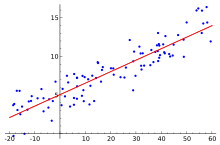
lsq¶
Least squares, matrix divide
x lsq y lsq[x;y]Where:
xandyare float matrixes with the same number of columns- the number of rows of
ydo not exceed the number of columns - the rows of
yare linearly independent
returns the least-squares solution of x = (x lsq y) mmu y. That is, if
d:x - (x lsq y) mmu ythen sum d*d is minimized. If y is a square matrix, d is the zero matrix, up to rounding errors.
q)a:1f+3 4#til 12
q)b:4 4#2 7 -2 5 5 3 6 1 -2 5 2 7 5 0 3 4f
q)a lsq b
-0.1233333 0.16 0.4766667 0.28
0.07666667 0.6933333 0.6766667 0.5466667
0.2766667 1.226667 0.8766667 0.8133333
q)a - (a lsq b) mmu b
-4.440892e-16 2.220446e-16 0 0
0 8.881784e-16 -8.881784e-16 8.881784e-16
0 0 0 1.776357e-15
q)a ~ (a lsq b) mmu b / tolerant match
1b
q)b:3 4#2 7 -2 5 5 3 6 1 -2 5 2 7f
q)a lsq b
-0.1055556 0.3333333 0.4944444
0.1113757 1.031746 0.7113757
0.3283069 1.730159 0.9283069
q)a - (a lsq b) mmu b / minimum squared difference
0.5333333 -0.7333333 -0.2 0.7333333
1.04127 -1.431746 -0.3904762 1.431746
1.549206 -2.130159 -0.5809524 2.130159lsq solves a normal equations matrix via Cholesky decomposition – solving systems is more robust than matrix inversion and multiplication.
Since V3.6 2017.09.26 inv uses LU decomposition.
Previously it used Cholesky decomposition as well.
Polynomial fitting¶
lsq can be used to approximate x and y values by polynomials.
lsfit:{(enlist y) lsq x xexp/: til 1+z} / fit y to poly in x with degree z
poly:{[c;x]sum c*x xexp til count c} / polynomial with coefficients c
x:til 6
y:poly[1 5 -3 2] each x / cubic
lsfit[x;y] each 1 2 3 / linear,quadratic,cubic(=exact) fits
-33 37.6
7 -22.4 12
1 5 -3 2Notice that lsq is very close to {x mmu inv y}.
q)A:(1.1 2.2 3.3;4.4 5.5 6.6;7.7 8.8 9.9)
q)B:(1.1 2.1 3.1; 2.3 3.4 4.5; 5.6 7.8 9.8)
q)A lsq B
1.211009 -0.1009174 2.993439e-12
-2.119266 2.926606 -3.996803e-12
-5.449541 5.954128 -1.758593e-11
q)A mmu inv B
1.211009 -0.1009174 7.105427e-15
-2.119266 2.926606 0
-5.449541 5.954128 7.105427e-15
inv,
mmu
Mathematics
LU decomposition,
Cholesky decomposition